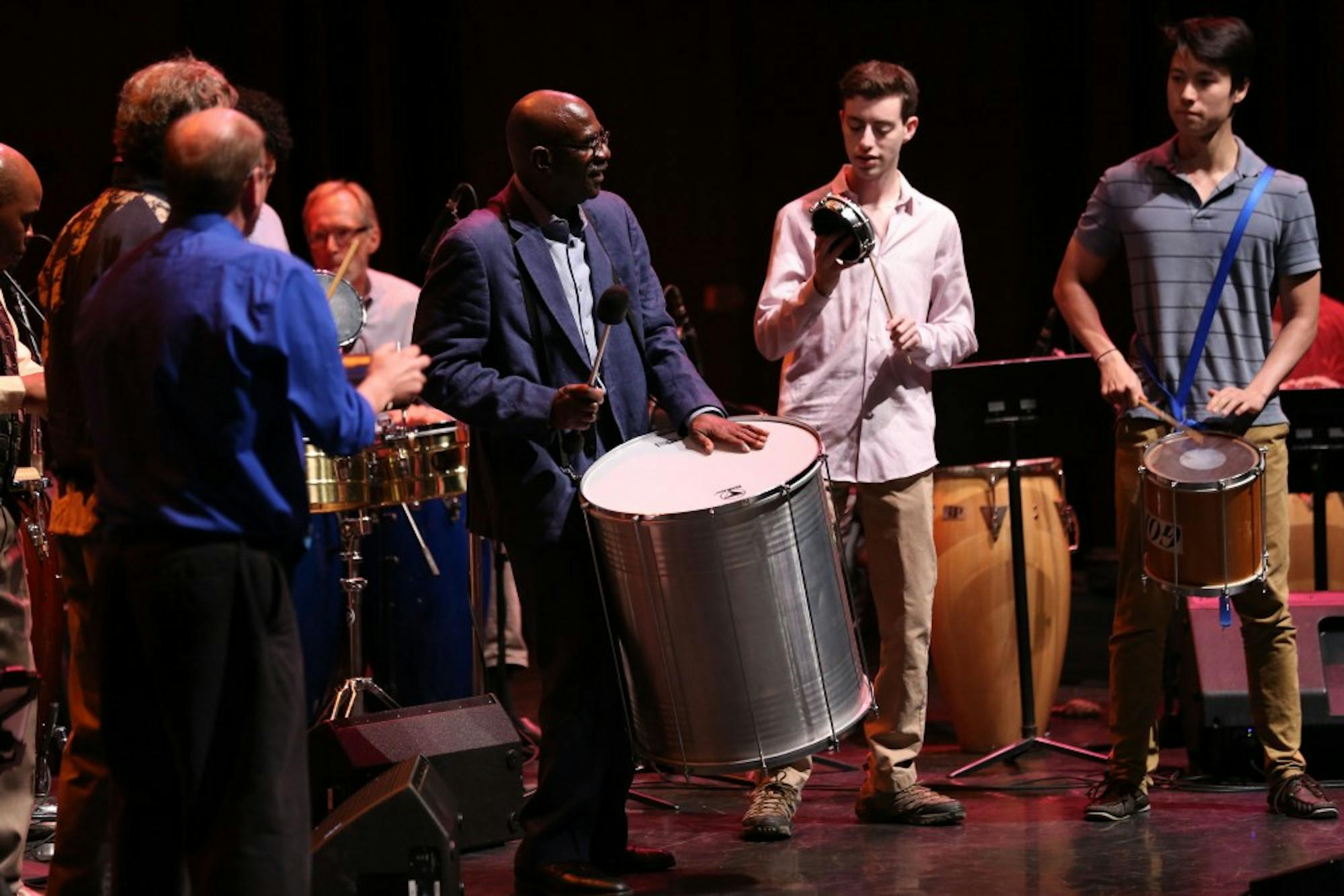Saturday’s World Music Percussion Ensemble performance was an important one for director Hafiz Shabazz — his 108th and final concert before retiring after more than 30 years as director. And for Shabazz, it was fitting that the performance was intended for children. Parents and grandparents filled the audience of the HopStop family show, crowding together on the floor with kids on their laps — but not for long. Soon, the kids were up and dancing to the energetic rhythms of Shabazz’s group.
“The Hopkins Center [for the Arts] asked me to do this performance a year ago, and when I agreed I don’t know if they knew it would be my last,” Shabazz said. “It all worked out just as it should have, that my last performance would be for children.”
Shabazz, a Dartmouth professor, ethnomusicologist and master drummer, has directed the ensemble since 1984. The World Percussion Ensemble has a repertoire that includes African rhythms, rock, salsa and numerous other genres. This year, the group performed in the fall with Latin Alternative quartet LADAMA, while its winter show took on the work of Bob Marley, Nigerian Afrobeat pioneer Fela Kuti and Senagalese guitarist Cheikh Lô.
“This is a wonderful way to finish my career,” Shabazz announced to the crowd. “You young people inspire me and have kept me going for all this time, so thank you.”
Shabazz had a commanding presence, standing at the center of the ensemble and smiling at the audience and the percussionists flanking him. The performance began with ceremonial music from Guinea. Shabazz introduced each piece by explaining its context and cultural significance, and at the first drum beat, he encouraged the children in the crowd to get up and dance. The ensemble played cohesively and with zeal, Shabazz keeping the group in rhythm and providing strong, dexterous vocals. Periodic smiles made it clear he was enjoying himself.
The energy in the room was joyous. Laughter and chattering from the children in the audience wove through the music and created a communal soundscape. During the fourth song, Shabazz invited four children to come up and try the drums. As they played — with a bit of tutelage from Shabazz — he directed each ensemble member to join in, until everybody, young and old, amateur and professional, made music together.
Shabazz customarily invites people to dance and have fun during the performance, said ensemble member Drew Siegel ’19, but inviting the children up was a surprise.
Five-year-old Clover attended the performance with her grandmother and was one of the lucky four to play with the ensemble.
“It was really fun to play the drums,” she said. “I like to dance to the music too — my favorite way to dance is twirling.”
Many kids grabbed their parents’ or grandparents’ hands to come and dance while Shabazz played. By the fifth song, more than half of the children in the audience were dancing, hopping and spinning on either side of the room. By the show’s end, even those still in their seats were tapping their toes and nodding their heads to the vibrant beat.
When the last drumbeat had faded, Shabazz received a standing ovation as a tribute to his career. Hopkins Center director Mary Lou Aleskie, presented Shabazz with a bouquet and thanked him for his work within the community.
“It’s sad that this is [Shabazz’s] last performance,” Siegel said. “[Shabazz] is a great guy. I’m honored to have played with him for three years, and I’ve learned a lot.”
Shabazz is clearly beloved by the community. After the performance, people lined up to take photos and congratulate him.
“When I first started the ensemble, it was the beginning of a journey,” Shabazz said. “Something I wanted to impart on Dartmouth students and professors and on the community was to stay in rhythm — that was my purpose and ambition, to bring together the community through rhythm. Everything is better and everybody is happier when you stay in rhythm.”




